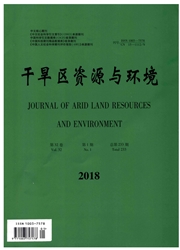

 中文摘要:
中文摘要:
研究农户土地价值观对农地非农化意愿的影响,为提高农户征地满意度,制定合理的征地补偿政策提供理论依据,对促进农村社会可持续发展,构建城乡和谐社会具有重要意义。通过构建农户土地价值观的维度与测量指标,运用结构方程模型对农户土地价值观与农地非农化意愿之间的关系进行衡量。结果表明:1)农户土地价值观可以分为土地包袱观、土地保障观、土地致富观、土地为本观4个维度。2)当前征地补偿标准条件下,大部分农户并不愿意流转土地,如果提供非农技能培训或者社会保障,农户农地非农化意愿显著提高。3)持土地包袱观、土地保障观的农户正向影响农地非农化意愿;持土地致富观、土地为本观的农户负向影响农地非农化意愿。研究表明不同土地价值观的农户农地非农化意愿不同,因此在制定合理的征地补偿政策时,应考虑到农户的不同心理需求,注重多元化的补偿方式。
 英文摘要:
英文摘要:
Researching the impact of rural- household' land values on the willingness of farmland conversion,which can provide theoretical basis for improving the rural- household' land requisition satisfaction and making reasonable land compensation policy,has a great significance to promote harmonious development of urban and rural social and build a harmonious urban and rural society. By constructing the rural- household' land values dimension and relevant measurement index,we draw the relationship between the rural- household ' land values and their land requisition willingness by the structure equation model( SEM). The results showed that: 1) The land values of rural- household could be divided into 4 dimensions,which contained land burden value,land security value,land wealth value and land fundamental value. 2) In the current compensation standards,most of rural- household didnt have the willingness of land transfer,if non- agricultural skills training or social security was provided,their willingness would improve significantly. 3) Rural- household with land burden value and land security value had a positive influence on farmland conversion willingness. Those with land wealth value and land fundamental value had a negative influence on farmland conversion willingness. The results proved that rural- household with different land values had different willingness on farmland conversion. So in the process of making reasonable land compensation policy,we should consider the rural- household ' different psychological demands,and pay attention to the diversification compensation ways.
 同期刊论文项目
同期刊论文项目
 同项目期刊论文
同项目期刊论文
 期刊信息
期刊信息
